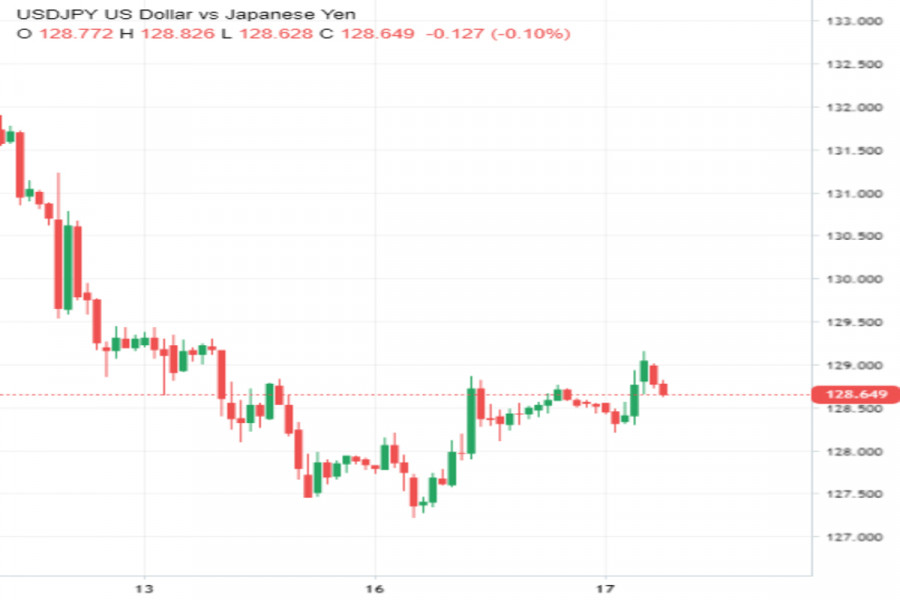USD/JPY traders are feeling nervous. The Bank of Japan will sum up the results of its 2-day monetary policy meeting on Wednesday. Now any surprise from the BOJ could have a significant effect.
The culminating event of the week in the currency market should be the Japanese central bank's monetary policy meeting, which kicked off on Tuesday.
With inflationary pressures intensifying in Japan and chaos reigning in the local bond market, many investors believe that the BOJ could announce a major policy shift this week, like it did last month.
Recall that the BOJ tweaked its Yield Curve Control policy (YCC) in December, causing the yen to rise sharply against the dollar. Since then the pair has fallen over 6% and its future prospects are not bright at all.
Investors clearly see that the BOJ is in a difficult predicament. Its decision to widen its tolerance range for 10-year bond yields was dictated by a desire to improve market functioning, as the bond market faced a liquidity problem. But the measure has made the situation even worse.
By changing the YCC, the BOJ stoked the flames of market speculation about its possible surrender. This in turn provoked a massive sell-off in 10-year Japanese Government Bonds (JGB), which pushed their yields up.
Since last week, the central bank has been trying its best to keep the index within the new limits by conducting daily emergency operations to buy JGBs. However the yield of 10-year JGBs is still growing above the set ceiling.
That's what leads investors to think that the BOJ will be forced to further increase the permissible range of long-term bond yield fluctuations from its 0% target at the January meeting.
If the BOJ makes such a decision again, it will serve as a great catalyst for the yen. In the short term, the USD/JPY risks falling below its 7-month low at 127.22.

An even greater threat to the pair is the development of a radical scenario, which implies a complete abandonment of the BOJ's YCC policy. If the central bank decides to burn all bridges, USD/JPY will go into a prolonged free-fall.
"The 10-year JGB yield could rise as high as 1% if the BOJ abandons yield curve control this week," according to estimates by Daiwa Securities strategist Eiichiro Tani. This negatively affects the movement of the pair.
According to analysts at Goldman Sachs, the next YCC correction will help the yen strengthen against the dollar by more than 3%, to the level of 125, and an abandonment of the YCC will open a fast way to even higher levels for the Japanese currency.
It's worth noting that US bank analysts don't even consider the latter scenario. Most of Goldman Sachs' analysts expect the BOJ to keep YCC in place with possible further tweaks to improve its sustainability.
Financial analyst Barbara Rockefeller is of the same opinion. She believes that we should not expect the BOJ to take impulsive actions in the form of abandoning the YCC or a sharp change in the monetary course.
"Allowing a giant move from 25 bp to 1% in under a month is too wild for any central bank, let alone the staid BoJ. So, abandonment is almost certainly out of the question, but that doesn't mean the market will not be expecting it and testing prices, forcing the bank to buy more bonds. We expect a whole lot of backroom arm twisting," Rockefeller said.
According to ING economists, the USD/JPY pair can fall sharply ahead of the results of the BOJ meeting. They suspect USD/JPY can trade down to 126.50 before Wednesday.
As for the dynamics of the dollar-yen asset after summing up the results of the BOJ meeting, everything depends on the market's reaction to the rhetoric of the Japanese officials. If it is considered hawkish, the quote will fall, as I mentioned before.
If the central bank stays true to its dovish principles, in the short-term, the pair may show a steady recovery from the recent lows. By the way, this scenario is followed by all economists recently surveyed by Bloomberg.
Experts expect the BOJ to refrain from any changes at its January meeting. But the probability they are wrong is quite high, because last month none of the 47 economists surveyed by Bloomberg was able to predict YCC changes.

RÁPIDOS ENLACES